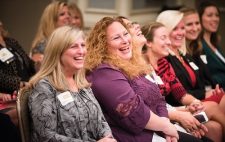 It’s a new world when it comes to retirement today. Seniors leaving the workforce want to stay vital, challenged and active. That’s definitely doable, but you have to consciously make the decision to keep your mind motivated and strong.
It’s a new world when it comes to retirement today. Seniors leaving the workforce want to stay vital, challenged and active. That’s definitely doable, but you have to consciously make the decision to keep your mind motivated and strong.
“The idea that learning stops at a particular age is a misnomer,” says psychologist Sarah Woldoff of Centra Comprehensive Psychotherapy & Psychiatric Associates in Marlton. Research shows learning new skills and taking up new hobbies as you age strengthens the brain, and Woldoff encourages older adults to do just that.
“Studies show that learning a language or how to play an instrument – at any age – is good for your brain,” she says. “Take a class, try painting, do puzzles and Sudoku. Sometimes small things, like just taking a different path home, are more stimulating for your brain than taking the same route every day. Try to expand your horizons.”
But testing your brainpower doesn’t always have to be done with a hobby, Woldoff says, though that’s usually the most fun. Woldoff works with older adults to develop strategies that will keep them healthy, organized and always thinking.
“As you age, there are also increased medical conditions, and with that comes increased medication management. We teach cognitive flexibility strategies to help you remember medication, like using a visual timer or setting up a pillbox at the beginning of the week.”
Strengthening your brain’s abilities will help keep you independent, Woldoff adds. She often comes across patients who are frustrated when they can no longer drive, so she urges them to turn it into a challenge.
“Problem solve! You have to make a strategy – learn the bus schedule, set a timer,” she says. “That’s a way to exercise the brain.”
Of course, continuing your personal relationships will also keep your brain alert and engaged.
“It saddens me when people retire and separate themselves,” says Camden County Freeholder Carmen Rodriguez. “That’s when you start to see people age mentally much more quickly than they should. Social engagement keeps your mind healthy and young.”
Rodriguez has seen firsthand how adults who regularly participate in the county’s many (and usually free) senior social events seem to stay strong mentally. Many SJ nonprofits and government organizations offer social events and clubs to keep retirees active, like concerts, socials, game nights, group exercise classes and dances. Many organizations also provide homecare and transportation services.
Rodriguez also suggests volunteering as another way for seniors to keep their minds challenged.
“I ask people to look at what’s in their neighborhood – find what you’re passionate about,” she says. “For instance, for our veterans or relatives of vets, find a nearby VFW post and see how you can connect with other veterans and help out.”
Some volunteering can be done as easily as looking to your town hall. “Link up with your township. Ask if you can help organize an event, a town birthday party, maybe a town-wide yard sale. It’s important to contribute meaningfully to your community,” Rodriguez says.
For those seniors who have made it a habit to exercise on a regular basis, they will experience the added benefit of exercising their minds too.
Retirees who exercise at Katz JCC in Cherry Hill seem more confident than those who don’t, notes Marcy Lahav, director of the adult cultural and Judaic department. “The people who are going to exercise classes tend to be the leaders, the volunteers, the people who are social,” she says. “They are not people who sit and want things done for them.”
Exercise classes like the ones at Katz JCC can be modified to work for both fit and not-so-fit retirees.
“Talk with a doctor first, especially if you have medical conditions, to find what’s best for you,” Lahav advises. “Don’t assume just going to the gym is good – everybody is different.” Before starting a regimen, call and arrange a tour of any health center to see what’s available. Lahav works with retirees who are looking for different things, whether that’s gym equipment, a pool or simple movement classes.
“I’ve been developing modified classes,” she says. “We have aerobic classes, but we can also do armchair aerobics or armchair yoga. You can sit or stand. You can use the weights or not. If you’re fearful of exercise, or situations like surgery or arthritis are preventing you from working out the way you used to, you can usually find something modified to meet your needs.”
Staying physically fit and maintaining overall good health will also contribute to a positive attitude and strong mentality. Proper nutrition is key. “Nutrition is medicine,” says Suzanne Mackey, MD, co-founder of WeighUnder in Voorhees. “The better our nutrition, the healthier our body will be. The healthier our body is, the healthier our brain will be.”
Mackey says the body loses 10 percent of its muscle mass every decade, and at age 60, that decline jumps to roughly every five years. “Every patient is different, and these are estimates, but staying physically active and eating enough protein will help you maintain muscle mass,” she says, adding that protein is important for retirees looking for help with balance and energy. “Eat a variety of minimally or non-processed foods, and make sure you have a nice variety of vegetables and fruits too.”
But keep in mind that as the body ages, fewer calories need to be consumed in a day. “Our resting energy expenditure – that’s the number of calories we burn in a sedentary day, just going through our normal activities – declines with age,” Mackey says. “There are different ways to calculate resting energy – our office uses a body composition machine, but using a food app like MyFitnessPal can give you a pretty reasonable estimation based on age, gender and weight.”
Since every aging body will be different and require a different daily caloric intake, Mackey stresses the importance of speaking with a doctor about diet.
“A physician can also assess risk for diabetes or pre-diabetes, depending on family and personal medical history,” she adds. Start thinking about diet as a necessary part of health, like you would any other medication.
Rick Levine, MD, medical director of Lourdes Medical Associates, also advises older adults to have an annual wellness visit, which is covered by Medicare. “It’s not a physical, but we talk about important health factors as you age, like having a living will, risk of falls, vision and hearing problems.”
Use these wellness visits to make a healthcare plan, Levine says.
“As you age, the immune system is not as strong as it used to be, so it becomes more important to prevent illness,” he says. “I talk with my patients about preventing illness through immunizations – pneumonia vaccine, updated tetanus and shingles vaccine are the big three.” He urges retirees to start asking their physicians about risk for diseases like diabetes and to stay on top of the tests they need as they age – colonoscopies are needed once at least every 10 years after age 50, and women should be getting regular mammograms in retirement. “And we start shingles vaccines at age 60,” Levin warns. “The older you are when you get shingles, the worse it can be.”
Levine stresses maintaining an open dialogue with your family doctor to live a healthy, fulfilling retirement. “The only stupid questions are the ones you don’t ask. Even if it’s something totally normal and expected, you shouldn’t have to stress about it for weeks or months when you could get answers from your doctor.”
Freeholder Rodriguez agrees. “Our healthcare system allows you to be healthy for a long time,” she says. “So why not enjoy your life as you get older? You can do so much to increase quality of life for yourself and others.”













